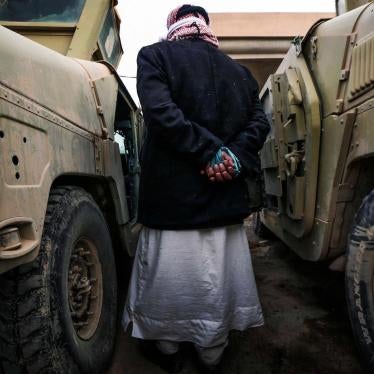The Yemeni government's arrest of an alleged al Qaeda member appeared to be a great success. As the suspect was receiving an award at Al Eman University in the capital, San'a, state security agents entered and grabbed him without firing a shot. "One of al Qaeda's most dangerous members arrested," Yemeni media proclaimed.
But the man security forces seized in April 2008 was not the notorious al Qaeda fugitive Abdullah al-Raimi, as Yemeni Defense Ministry officials asserted. Rather, he was Abdullah Sa'd Ghazi al-Raimi, a religion student who was a decade younger than the al Qaeda member, with a different middle name.
"I thought it would be easy to get him out because he obviously wasn't the right person," the student's brother, Abd al Basit, told me in Yemen a year ago. But Yemen's Political Security Organization-which reports to the president-held Abdullah Sa'd for 20 months without charge, despite three letters from the Yemeni attorney general's office requesting his release.
Abdullah Sa'd and his relatives declined interview requests after he was quietly freed in December 2009. Reliable sources told Human Rights Watch they had received information that Yemeni authorities beat him, forced him to stand in stress positions and held him for the first 40 days in solitary confinement in a dark, windowless dungeon-even though they had the fingerprints and photographs of the fugitive al-Raimi on file.
The case of Abdullah Sa'd should serve as a stark reminder to the US and its allies as they meet with Yemeni officials in London on Wednesday to craft a strategy to confront Al Qaeda in the Arabian Peninsula (AQAP), the group's Yemen-based franchise. If donors don't stringently monitor and condition their planned counterterrorism aid for Yemen, they may inadvertently become complicit in such abuse.
In recent years, President Ali Abdullah Saleh has rounded up hundreds of alleged militants on little or no evidence to show foreign governments that he is tough on terrorism. His security agents also have taken hostage dozens of men in an effort to force the surrender of relatives the authorities suspect of involvement in al Qaeda. One man I interviewed a year ago in Yemen wept as he described how his reputation and business were ruined from being held hostage for two and a half months in an effort to bring in his brother, who had fought in Iraq.
While these men languish in prisons, President Saleh has allowed ranking al Qaeda members to remain at large or under house arrest.
Recent raids by Yemeni security forces suggest President Saleh is now serious about confronting AQAP. But the president has cracked down on al Qaeda several times since 2001, only to ease up once international attention turned elsewhere. Moreover, many government claims about killing or capturing key AQAP members since the l latest counterterrorism offensive began last month lack credibility.
Among other misstatements, Yemeni officials initially said they were almost certain that a US-assisted air strike on December 24 killed AQAP's top two leaders-commander Nasir al-Wuhaishi, and deputy commander Sa'id Ali al-Shihri-as well as the American-born cleric Anwar al-Awlaqi. But the Yemenis backpedaled after failing to produce any evidence. On January 19, Yemeni officials claimed to have captured al-Shihri, but then said the arrested man was his brother-in-law, Yusuf al-Shihri. (Yusuf al-Shihri, however, had long been reported dead.)
The government also said it killed AQAP's third in command, Qassim al-Raimi, as well as the head of the AQAP cell in Marib, on January 15, but Yemeni media cast doubt on those claims by reporting that the two were spotted later at a dinner.
Gaffes in such high-profile cases can be tracked. But with poor intelligence from remote areas outside central government authority-where most al Qaeda members operate-the US and its allies will have difficulty assessing whether the Yemeni forces it intends to continue training, financing or advising are killing or capturing genuine AQAP members, or perhaps ordinary Yemenis whom officials later brand as militants. The US will be similarly handicapped in determining whether the attacks are being used to take out political opponents and critical journalists.
The US-assisted air strikes on alleged AQAP targets in southern Abyan last month reportedly killed women and children, prompting outrage among the Yemeni public, whom the West can ill afford to alienate. US Gen. Stanley McChrystal learned the hard way about how those attacks can backfire. "We must avoid the trap of winning tactical victories-but suffering strategic defeats-by causing civilian casualties or excessive damage and thus alienating the people," he noted in a recent directive on Afghanistan.
Abdullah Sa'd, the student arrested in the case of mistaken identity, is a testament to the dangers of that trap. He is a devout Muslim who was receiving an award for memorizing the Quran when he was arrested, and sources said he had been optimistic that he would teach religion upon graduation and had intended to use his award money to pay for his wedding. Now, stigmatized as a terrorist, he can't find a job and his fiancée's father has called off the marriage. He spends his days at home in San'a, fretting about his future.
"His life has been destroyed," one source said.
Unless Washington and its allies ensure their assistance is not used for abuses that sow bitterness and alienation, they will never succeed in rallying popular support to rout AQAP from Yemen.






